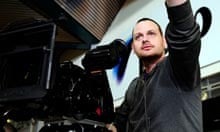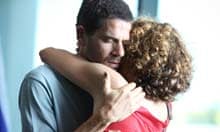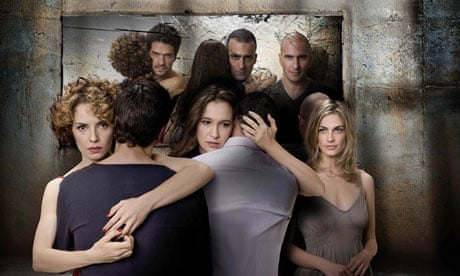Hostage-taking is a raw, sensitive subject in Israel. There are 1,500 former prisoners of war living there – an incredible number, given its population is around the same as London's. Meanwhile, Israel has released an estimated 10,000 imprisoned Palestinian terrorists in the past 25 years, usually in group deals to free its own captured troops. Statistics show that many released terror suspects soon reoffend, meaning Israeli PoWs become crippled by guilt. Soldiers released in prisoner exchanges report feeling blamed for every terrorist attack after the swap. When a bus gets blown up, they see accusing eyes on them, as if the bombers being freed to commit such atrocities is their fault.
No surprise, then, that Prisoners of War (Hatufim) – the Israeli TV drama on which Channel 4's US hit Homeland is based – is even more emotionally charged and wrenchingly powerful than its US remix. Sure, Homeland taps into America's obsession with Osama Bin Laden and the "war on terror" but it soon spins off into more conventional thriller territory. Hatufim is grittier and less glossy, yet equally as gripping.
"Right from the start, Homeland fans will recognise some scenes as more or less identical," says Hatufim's creator, writer and director Gideon Raff. "The airport homecoming is pretty much word for word; the wife seeing the husband's scars; the early plot device of the finger-tapping which could be a coded signal. The heart and the main themes are the same, but other things are very different."
When Hatufim (Hebrew for "kidnapped") aired on Israel's Channel 2 two years ago, it became the country's highest-rated drama of all time. "That took me by surprise," says Raff. "I never expected the biggest network to want it, let alone show it on Saturday nights. That was brave."

Before Raff had shot a frame, on the strength of the script alone his creation was bought by Hollywood. "Howard Gordon and Alex Gansa were just coming off 24 and looking for their next project. They loved my pilot script, so we started meeting in Los Angeles to discuss turning it into an American show. A lot of the changes came down to differences between the two countries. In Israel, we negotiate with terrorists to get prisoners released. The US don't, so Brody had to be freed in a military operation. In Hatufim, I wanted to show broken soldiers, broken masculinity; whereas in Homeland, Brody comes back buffer, a poster boy."
Raff stayed on board and is still a writer and exec producer on Homeland, flitting between the two countries and two shows. "It gets confusing at times but they're very different beasts," chuckles Raff. "The Homeland pilot alone cost more to make than both seasons of Hatufim. When I tell my American counterparts that my budget was $200,000 per episode, they burst out laughing. To us that's a big production, to them it's a guerrilla shoot. "
So how did Raff, who's still only 39, create not one but two critically adored, gong-garlanded shows? Israel-born, he came up with the idea while living in LA, where he attended the American Film Institute. "I'd been there nine years and felt like I was in exile," he says. "Every time I came back to Israel, which was supposed to feel like home, it felt more different. Things changed, people had moved on. Somehow that got me thinking about prisoners of war coming back after an enforced absence."
Once Raff embarked upon his extensive research – talking to dozens of former PoWs, their families, therapists and interrogators – he realised that homecoming signals the end of most PoW stories. He resolved to make his narrative start at a point where the rest finish. "I discovered a whole world of untapped drama. Here in Israel, we want the boys back home, we demand it from our government, who often pay a steep price to get hostages back. But we need a happy ending. We don't want to deal with those days after release, their post-trauma or reintroduction to society. Yet coming home is only the start of their journey. For some, it's even harder than captivity."
Hatufim tells the story of three Israeli reservists captured behind enemy lines in Lebanon. Seventeen years later, they're freed. Two come back alive, the third in a coffin. The 10-part series unfolds as a psychological puzzle, flashing back to their time in captivity as they try to rebuild their lives while dealing with their loyalties being questioned during in-depth debriefings.
The torture scenes are more visceral than Homeland's, involving electrocution and firing squads. "They're hard to watch for some people," says Raff, "but I thought it was moot to talk about post-trauma without seeing the trauma. The real former PoWs were completely unaffected by the torture scenes. It was the stuff between husband and wife – in the bedroom, him hitting her in his sleep – that spoke to their experiences. Every weekend when the show finished, I'd get very moving phone calls from PoWs I'd interviewed. I'm still in touch with many of them."

Hatufim is more an ensemble piece than double-header Homeland, putting three families at the heart of the action. "The PoWs went through something so horrible, you don't know who's coming back. Suddenly there's a stranger in the house. I put a big emphasis on their families, because they were prisoners too. All their lives stopped. They're stuck campaigning or waiting. The one wife in Hatufim who moved on [reported under the newspaper headline "Cheating on an entire nation"] sparked a huge discussion here: 'How long would you wait?'" This domestic drama, Raff believes, is the main difference between original and remake. "Homeland is a straight thriller – is he a terrorist or not? What's relevant for an American audience is the enemy within, whether the war hero's been turned. Israeli audiences are more interested in the relationships, the emotional ride, the secrets and suspense."
Israeli TV is enjoying a hot streak right now. Hebrew psychiatry drama BeTipul was remade as In Treatment by HBO, which is also adapting Israeli police procedural The Naked Truth. Julia Stiles will play the lead in Midnight Sun, NBC's remake of kibbutz-set conspiracy thriller Pillars of Smoke (Timrot Ashan). The rights to Yellow Peppers, a series about a farming family with an autistic son, have been snapped up by Mad Men's studio, Lionsgate.
It's an unlikely purple patch for a modest TV industry that only got its first commercial channel in 1993. "Israel's a small country but both the audience and programme-makers are very sophisticated," says Raff. "We have to be creative on a tight budget, which encourages strong storytelling. We have an auteur-led approach; it's less of a machine, more about creators with vision."
This thriving TV industry has become a great source of national pride. "When Homeland got the Golden Globe, the headline on one of our newspapers was, 'We won!' The whole country celebrated. Then Claire Danes said on Conan O'Brien that Tel Aviv was a fun city and for a week everybody walked a little taller here."
It's been quite a ride for Raff, too. "I met Ricky Gervais at the Golden Globes and he told me how much he loved Homeland, plus of course it's Obama's favourite show. It's been an amazing year."
Raff has just shot the second series of Hatufim, which airs in Israel next month. "People have been coming up to me in the street, saying they can't wait. And the Homeland crew is coming over here next week to start shooting the second season. We've become one big happy family. We don't even know which show we're shooting any more."
Homeland concludes Sun, 9pm, Channel 4; Prisoners of War (Hatufim) starts Thu, 9.30pm, Sky Arts 1






Comments (…)
Sign in or create your Guardian account to join the discussion